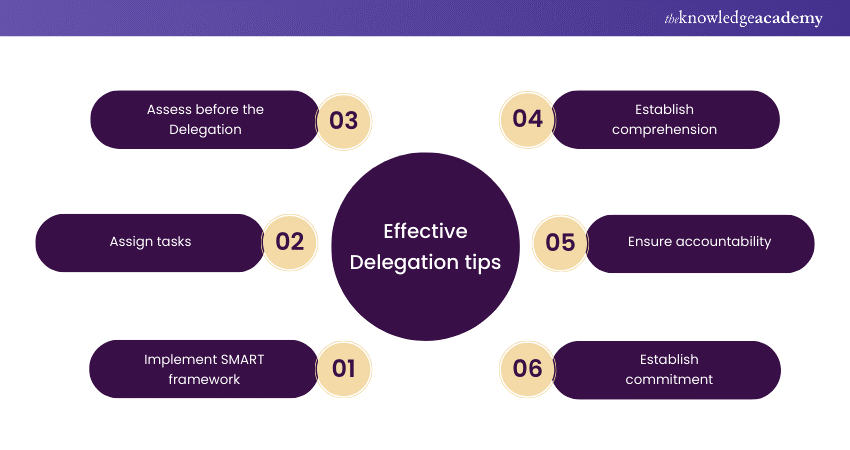We may not have the course you’re looking for. If you enquire or give us a call on +971 8000311193 and speak to our training experts, we may still be able to help with your training requirements.
Training Outcomes Within Your Budget!
We ensure quality, budget-alignment, and timely delivery by our expert instructors.

Delegation can offer many benefits, both for leaders and employees. It can help managers minimise their workload and focus on higher-level goals while maximising productivity. It can also help employees build skills and feel empowered. However, without the correct Principles of Delegation, it may become challenging.
Hence, in this blog, we will discuss the Principles of Delegation and some tips for effective Delegation.
Table of Contents
1) What are the Principles of Delegation?
a) Principle of Defining Functions Clearly
b) Principle of Single Command
c) Principle of Matching Authority with Responsibility
d) Principle of Unquestionable Responsibility
e) Principle of Results-Based Delegation
f) Principle of Authority Boundaries
g) Principle of Adequate Motivation
h) Principle of Efficient Monitoring
2) Advantages of Delegation in the workplace
3) Effective Delegation tips
4) Conclusion
What are the Principles of Delegation?
Delegation is a function of the manager. Every manager follows certain principles, which can help to process the Delegation. Delegation helps to empower the team and increase collaboration and productivity. Some of the Principles of Delegation are mentioned below:

Principle of defining functions clearly
The principle of defining functions explains the task and role of an individual required to achieve a goal. It covers the approach, expectations, deadlines, objectives, and outcomes. This principle helps team members understand their responsibilities without creating any confusion.
Principle of single command
The principle of single command focuses on receiving directions from one authority. Multiple instructions from different authorities can confuse the Delegation. Knowing they have one authority to report to also makes the communication coherent.
Principle of matching authority with responsibility
The principle of matching authority with responsibility includes authority corresponding to responsibility. The authority without responsibility leads to an individual's inefficiency. This principle allows managers to create a balance between both components.
Principle of unquestionable responsibility
The principle of unquestionable responsibility gives an employee total control of a project or task, as partial authority is ineffective. Complete ownership of work may result in motivation and job satisfaction.
Principle of results-based Delegation
The principle of results-based Delegation focuses on assigning tasks and responsibilities based on anticipated results and outcomes. Managers can achieve this by explaining business objectives and checking that team members' efforts align with these goals.
Principle of authority boundaries
The principle of authority boundaries allows managers to restrict individuals' power to prevent misuse of authority. A set of guidelines with clear instructions will enable employees to understand what they can and cannot do.
Principle of adequate motivation
The principle of adequate motivation focuses on introducing incentives for employees. This helps team members stay motivated and fulfil their responsibilities with accountability.
Principle of efficient monitoring
The principle of efficient monitoring states that managers should have a control system for evaluating team members' performance. This helps managers measure how individuals implement their authority.
Learn effective team leadership and management skill with our Successful People Management and Team Leadership - sign up now!
Advantages of Delegation in the workplace
Delegating tasks to employees in the workplace is very important for enhancing the organisation's collective output. So, let's learn about other advantages of workplace Delegation.
1) Promoting trust: Team members feel empowered if the manager trusts them to complete a project and task. This further develops a relationship between managers and team members, resulting in increased morale at work.
2) Acquiring new skills: When a manager assigns tasks beyond an individual's regular duties, it enables them to learn new skills. This helps employees find growth and be creative, which leads to the organisation's innovative breakthroughs.
3) Team development: Delegation in a workplace allows optimal allocation of tasks. It will enable the team to manage big projects in a short timeline. This further results in higher revenue and profit for the organisation.
4) Enhanced morale: The Principle of Delegation allows equal distribution of work. It increases team morale, leading to higher efficiency and productivity.
5) More accountability: When managers show confidence in employees' abilities and talents, they feel more accountable for their work. The employees put in more effort and ensure their actions result in outcomes.
6) Minimises stress: Managers can maintain equality in work allocation if they know how to delegate tasks to employees. It minimises stress in the workplace and creates a positive work culture.
7) Higher work-life balance: The Principles of Delegation allow team members to maintain a higher work-life balance by reducing their work burden. This further helps their mental health.
8) Concentrate on essential tasks: Delegation allows managers to concentrate on important tasks. They can focus on the organisation's priority areas rather than micromanaging.
Enhance your team leadership skills with our Supervision Training - sign up now!
Effective Delegation tips
There are specific steps that managers require for an Effective Delegation. The manager ensures they have given the employees enough authority and resources to complete the tasks. Below are essential tips that managers can follow for effective Delegation.

1) Assess before the Delegation: The manager conducts an assessment of the tasks before delegating them to the employees to clearly communicate the objectives and expectations. This helps them understand what to achieve and which team member is ideal for that particular task.
2) Assign tasks: After assessing the tasks, the manager knows the right employee. They can now assign tasks to team members based on the individual's skills, availability, and interests.
3) Implement SMART framework: The manager uses the SMART framework to make the Delegation more effective. SMART goals are Specific, Measurable, Achievable, Relevant, and Time-based. They also show what resources employees need and what constraints they face.
4) Establish comprehension: When the manager explains the task’s objectives and expectations, he ensures the team members understand their responsibilities correctly. The manager may also create a written document with clear instructions.
5) Ensure accountability: The manager offers the necessary resources and support to the team members to help them succeed in their roles. The manager can increase the accountability of their Delegation by encouraging Effective communication communication, establishing benchmarks for subtasks, and discussing the consequences of delivering incomplete work.
6) Establish commitment: The manager can organise follow-up meetings to check the commitment of team members to their work. This allows the manager to discuss the project's importance with the team and what skills they may learn while completing the tasks.
Conclusion
Understanding the Principles of Delegation creates a win-win situation for the manager, employee, and business. By incorporating this principle, managers can help team members improve efficiency, output, morale, and collaboration. Moreover, it allows the organisation to achieve its predefined goals and objectives.
Master the art of assigning tasks with our Delegation Training- sign up now!
Frequently Asked Questions

Delegating tasks to employees in the workplace is very important for enhancing the organisation's collective output and employees’ morale and skills.

The six Principles of Delegation are principle of defining functions clearly, principle of single command, principle of matching authority with responsibility, principle of unquestionable responsibility, principle of results-based Delegation and principle of authority boundaries.

The Knowledge Academy takes global learning to new heights, offering over 30,000 online courses across 490+ locations in 220 countries. This expansive reach ensures accessibility and convenience for learners worldwide.
Alongside our diverse Online Course Catalogue, encompassing 17 major categories, we go the extra mile by providing a plethora of free educational Online Resources like News updates, Blogs, videos, webinars, and interview questions. Tailoring learning experiences further, professionals can maximise value with customisable Course Bundles of TKA.

The Knowledge Academy’s Knowledge Pass, a prepaid voucher, adds another layer of flexibility, allowing course bookings over a 12-month period. Join us on a journey where education knows no bounds.

The Knowledge Academy offers various Leadership Course including Leadership Skills, Supervising A Team, People Management and others. These courses cater to different skill levels, providing comprehensive insights into Performance Management.
Our Business Skills Blogs covers a range of topics related to Scrum, offering valuable resources, best practices, and industry insights. Whether you are a beginner or looking to advance your Business Improvement skills, The Knowledge Academy's diverse courses and informative blogs have you covered.
Upcoming Business Skills Resources Batches & Dates
Date
 Delegation Training
Delegation Training
Fri 7th Feb 2025
Fri 4th Apr 2025
Fri 6th Jun 2025
Fri 1st Aug 2025
Fri 3rd Oct 2025
Fri 5th Dec 2025







 Top Rated Course
Top Rated Course



 If you wish to make any changes to your course, please
If you wish to make any changes to your course, please


